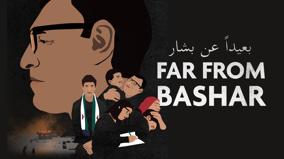New release
Coming
None
 In Full Voice
In Full Voice
2021
52 min
Leaving soon
Muslim women are disconcerting, intriguing, polarizing—and straitjacketed by conflations of ideas in front-page stories. While the media tend to portray them as submissive and silenced, filmmaker Saïda Ouchaou-Ozarowski has chosen to distance herself from that caricature, with which she does not identify. She sat down with six Muslim Canadian women eager to talk about what shapes their identities. The resulting documentary, In Full Voice, offers an intimate perspective on the journey of these women, who have a common desire to share their visions of Islam.

Details
Muslim women are disconcerting, intriguing, polarizing—and straitjacketed by conflations of ideas in front-page stories. While the media tend to portray them as submissive and silenced, filmmaker Saïda Ouchaou-Ozarowski has chosen to distance herself from that caricature, with which she does not identify. She sat down with six Muslim Canadian women eager to talk about what shapes their identities. The resulting documentary, In Full Voice, offers an intimate perspective on the journey of these women, who have a common desire to share their visions of Islam.
-
writerSaida Ouchaou-Ozarowski
-
researchSaida Ouchaou-OzarowskiMarika LapointeHind Boughedaoui
-
directorSaida Ouchaou-Ozarowski
-
script advisorMarquise Lepage
-
participantLoubna AkhabirKenza BennisEman El-HusseiniSonia GhayaFarheen HaqAsmaa Ibnouzahir
-
director of photographyKaterine Giguère
-
location soundLynne TrépanierCatherine Van Der DoncktChristine LebelStéphane Bourgault
-
editingNatacha Dufaux
-
sound editingCatherine Van Der Donckt
-
development consultantKenza BennisJean-François CaissyCarmen Garcia
-
original musicBrigitte Dajczer
-
musicianBrigitte DajczerTacfarinas KichouMarton MaderspachAlix Noël-GuéryAntoine Pelegrin
-
singerLamia Yared
-
music mixingJera Cravo
-
production managerChristine BeaudryAmanda Naseem
-
camera assistantAmélie Lambert-BouchardSimon RodrigueJulien Duchêne
-
illustrationsMélanie Baillairgé
-
animationBren López Zepeda
-
foleyStéphane Cadotte
-
production assistantDarlene Lenden
-
foley recordingAnnie-Ève Dumontier
-
online editingSerge Verreault
-
colourizationSerge Verreault
-
infographicsAlain Ostiguy
-
animated graphicsAlain Ostiguy
-
sound mixingIsabelle Lussier
-
subtitlesMELS StudiosPower of Babel
-
translationMELS StudiosPower of Babel
-
marketing managerGeneviève Bérard
-
production coordinatorSara SajediAliou DialloAlexandra Bourque
-
administratorAlexandrine Torres de Figueiredo
-
delegate producerAlexandrine Torres de Figueiredo
-
technical coordinatorJean-François LapriseDaniel Claveau
-
technical supportPatrick TrahanMarie-Josée GourdePierre Dupont
-
legal counselJulie Patry
-
producerDenis McCreadyDominic Desjardins
-
executive producerDenis McCreadyDominic Desjardins
Education
Ages 11 to 18
Study Guide
Mini-lessons
School subjects
















